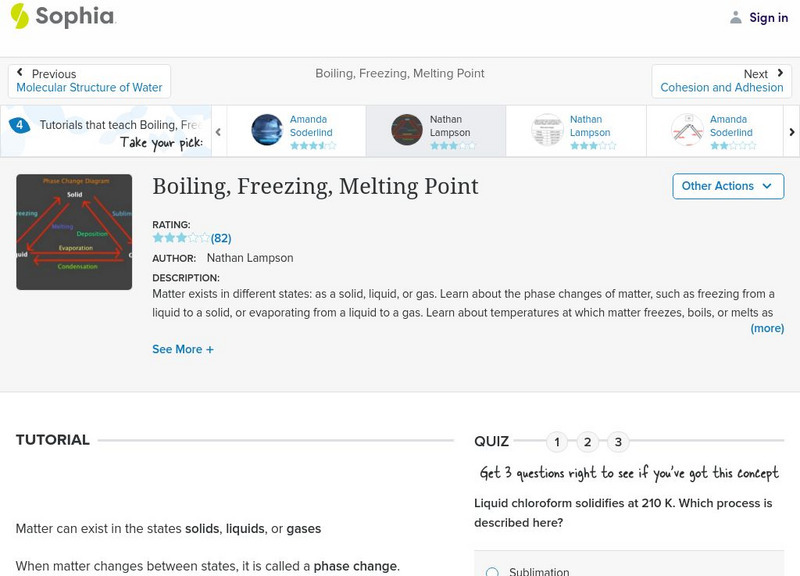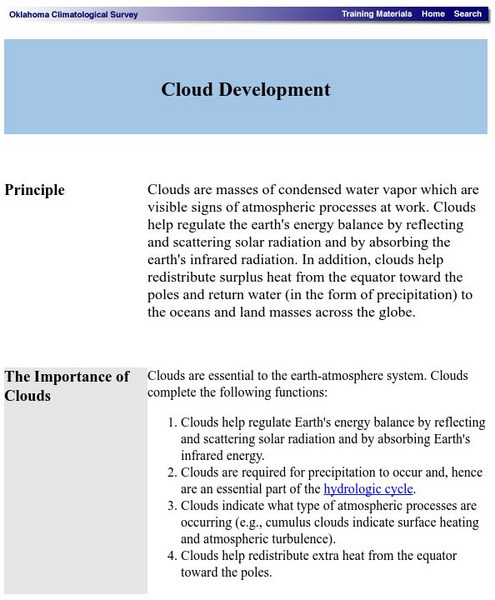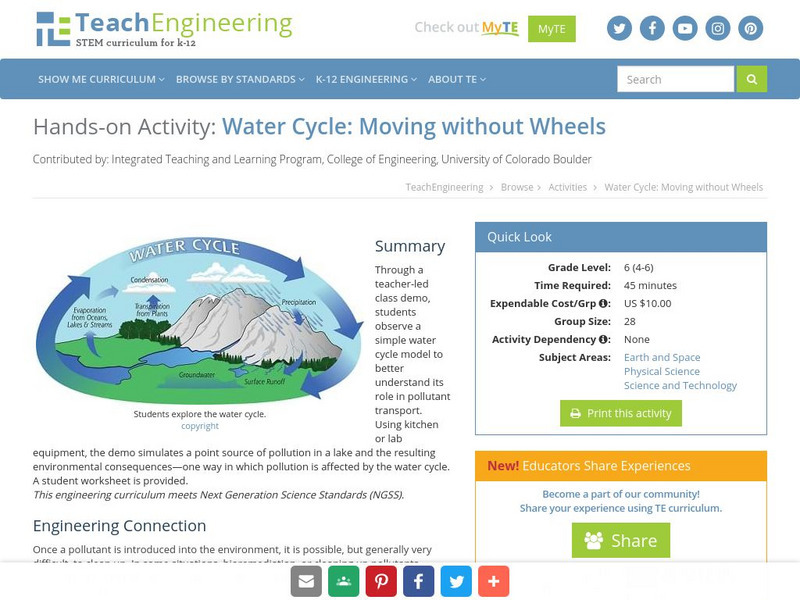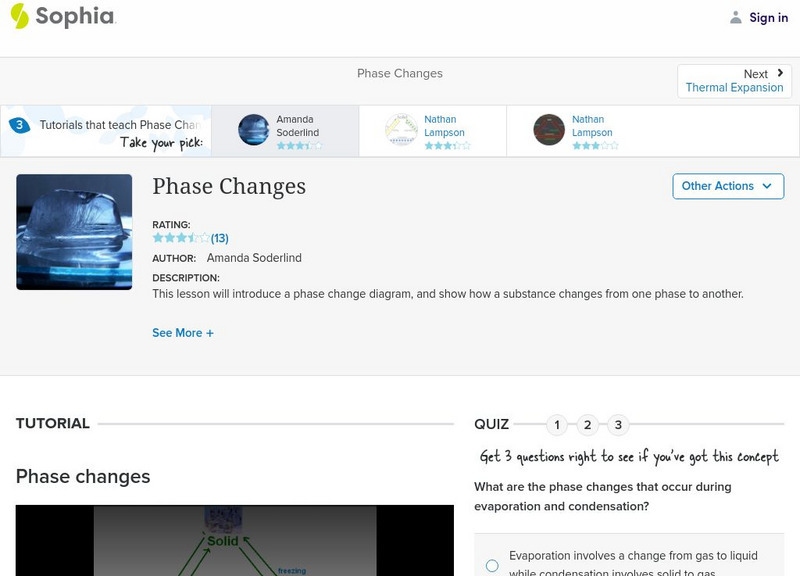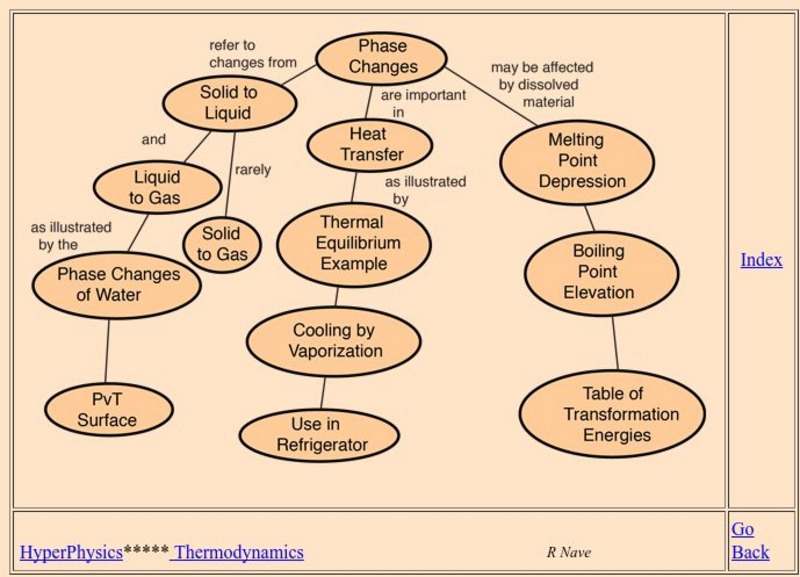TeachEngineering
Teach Engineering: Ocean Water Desalination
Learners learn about the techniques engineers have developed for changing ocean water into drinking water, including thermal and membrane desalination. They begin by reviewing the components of the natural water cycle. They see how...
CK-12 Foundation
Ck 12: Episd: Water Cycle
[Free Registration/Login may be required to access all resource tools.] An introduction to the biogeochemical cycle, the water cycle. Recognize evaporation, sublimation, and condensation. Identify groundwater and runoff water supplies.
US Environmental Protection Agency
Epa: The Water Cycle [Pdf]
An illustrated diagram of the water cycle that students can use for study.
Science Education Resource Center at Carleton College
Serc: Mn Step: Weather/water Cycle
In this activity, students will learn about the water cycle through a story, a song, and a game, and relate it to the weather that they observe.
Missouri Botanical Garden
Missouri Botanical Garden: The Water Cycle
This simple overview provides definitions of key terms in the water cycle and a diagram showing the path water takes in this cycle.
Other
New Jersey Section of the American Water Works Association: The Water Cycle
Simple diagram and explanations of the water cycle and related terms.
Sophia Learning
Sophia: Boiling, Freezing, Melting Point: Lesson 2
This lesson will introduce the phase changes that occur at the boiling, freezing, and melting points. It is 2 of 4 in the series titled "Boiling, Freezing, Melting Point."
Sophia Learning
Sophia: Boiling, Freezing, Melting Point: Lesson 4
This lesson will introduce the phase changes that occur at the boiling, freezing, and melting points. It is 4 of 4 in the series titled "Boiling, Freezing, Melting Point."
Sophia Learning
Sophia: Boiling, Freezing, Melting Point: Lesson 1
This lesson will introduce the phase changes that occur at the boiling, freezing, and melting points. It is 1 of 4 in the series titled "Boiling, Freezing, Melting Point."
ClassFlow
Class Flow: Water Cycle
[Free Registration/Login Required] In this lesson students study the phases of the water cycle.
ClassFlow
Class Flow: Water Cycle
[Free Registration/Login Required] This is an activity flipchart that asks students to label the various phases of the water cycle.
ClassFlow
Class Flow: Water Cycle
[Free Registration/Login Required] This is a science flipchart that reviews the stages of the water cycle and also ways in which the water cycle affects weather such as hurricanes and tornadoes.
ClassFlow
Class Flow: Water Cycle
[Free Registration/Login Required] Using this flipchart students study the phases of the water cycle and its importance to the earth. Assessment questions use Activotes.
ClassFlow
Class Flow: The Water Cycle
[Free Registration/Login Required] This lesson covers information for middle grade students relative to the basic functions of the water cycle.
Science Struck
Science Struck: A Simple Guide to the Steps of the Water Cycle
The steps in the water cycle and the processes that occur are explained in this resource.
Internet Encyclopedia of Philosophy
Internet Encyclopedia of Philosophy: Anaximenes
This site from the Internet Encyclopedia of Philosophy provides a brief biography of Anaximenes and summary of his thought.
Oklahoma Mesonet
Oklahoma Climatological Survey: Cloud Development
This site explores the importance of clouds and how clouds are formed. Content details common atmospheric cooling mechanisms and atmospheric stability.
Science Education Resource Center at Carleton College
Serc: Investigating Three Main Ingredients Needed to Create a Cloud in a Bottle
In the science lab, students will create and observe the conditions necessary to make a cloud in a bottle.
American Chemical Society
Middle School Chemistry: Chapter 2: Changes of State
Five chemistry lessons about phase changes between the states of mattter complete with handouts and animations.
TeachEngineering
Teach Engineering: Moving Without Wheels
In a class demonstration, students observe a simple water cycle model to better understand its role in pollutant transport. This activity shows one way in which pollution is affected by the water cycle; it simulates a point source of...
TeachEngineering
Teach Engineering: Natural and Urban "Stormwater" Water Cycle Models
Students apply their understanding of the natural water cycle and the urban stormwater water cycle, as well as the processes involved in both cycles to hypothesize how the flow of water is affected by altering precipitation.
Sophia Learning
Sophia: Phase Changes: Lesson 1
This lesson will introduce a phase change diagram, and show how a substance changes from one phase to another. It is 1 of 3 in the series titled "Phase Changes."
National High Magnetic Field Laboratory
Magnet Academy: Bubble Chamber 1952
To understand a bubble chamber, picture the long, white streak an airplane leaves in its wake. That's water vapor produced by condensation from the plane's hot exhaust. Until the water particles evaporate, you can follow the streak to...
Georgia State University
Georgia State University: Hyper Physics: Phase Change Concepts
An indexing page for the HyperPhysics site. This page includes links to a variety of pages at the site which contain information related to phase changes. Each individual page consists of informative graphics and clear explanations.



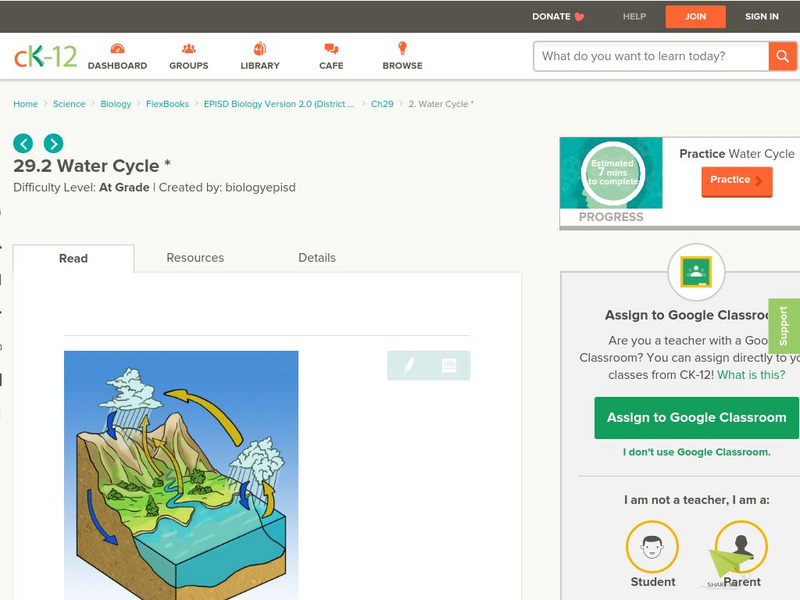
![Epa: The Water Cycle [Pdf] Graphic Epa: The Water Cycle [Pdf] Graphic](https://content.lessonplanet.com/knovation/original/42176-ac4345d9392f3783430ed3628fd17cec.jpg?1661261553)



